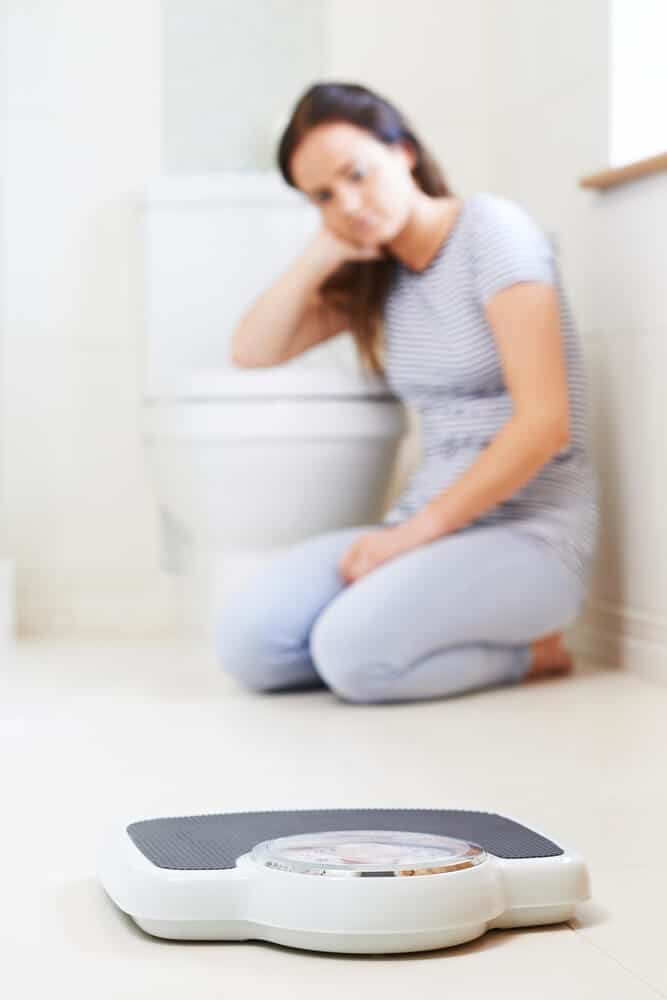
Laxatives are a type of medicine which is normally used for treating constipation. They work by softening stools so they’re easier to pass or by stimulating your lower intestines so they can push stools out more easily. Although doctors sometimes recommend the use of laxatives on occasion for those who suffer from constipation, there’s a dark side to their use: abuse. Potentially, when someone has an eating disorder, they may develop a problem with laxative abuse. This means that they begin using laxatives very frequently to help them to lose weight.
Laxative Abuse – A Definition
The term “laxative abuse” is used to refer to ongoing and repeated laxative use to get rid of consumed food or to purge calories. The idea behind this form of substance abuse is a belief that laxatives move food more rapidly through the body so it can be cleared out before any calories – or nutrients – can be absorbed by the body.
Packs of laxatives have warnings on them which say that those who use this type of medication for over 7 days may result in severe long-term problems. However, those with eating disorders often disregard those warnings.
Lots of people who choose to abuse laxatives take a larger dose than recommended and increase the amount they take over time when their body starts to become used to the extra help that it’s getting. Others may take smaller amounts, and may even use the dose that is recommended, but their laxative use lasts for much longer than would be safe.
How Does Digestion Work?
The process of digestion begins from the moment you put food into your mouth. When you chew food, it breaks it down so it can be more easily processed by your body. Once the food reaches your stomach, digestive enzymes and acids process the food even more before it empties into your small intestine. Here, the process of digestion continues. Enzymes produced by the pancreas and bile produced by the liver help the process along and it is at this stage that water and nutrients from the food get absorbed by the small intestine’s walls into your bloodstream. The waste products then move on into your large intestine and are stored in the rectum at its lower end until you go for a bowel movement.
Do Laxatives Actually Help Weight Loss?
It’s a myth that laxatives can promote weight loss. This is because laxatives work on your large intestine. Once food reaches this part of your body, the calories have already been absorbed by your small intestine. Bowel movements triggered by laxatives don’t contain many calories, fat or food. However, laxatives do cause water, minerals, waste products and electrolytes to be lost temporarily. This often makes the user feel as if their stomach is flatter or their weight may be a little lower when they jump on the scales. However, as soon as they drink some water, their weight will go back to normal.
What Are The Risks Of Laxative Abuse?
If you take laxatives for an extended period, your body will begin to rely on their help to move the waste products through your body. Both physically and psychologically, you will become dependent on using laxatives, and this can happen quite quickly.
Although laxatives are used for treating episodes of constipation, laxative abuse can make constipation worse. This is because laxatives artificially irritate or stimulate the nerves inside your large intestine. When these nerves are stimulated, the muscles of the intestines contract, thus moving stools out of your body. However, if they are used in large quantities or for extended periods, the laxative can actually damage those nerves.
Another risk comes from having an empty colon. If the colon’s muscles can’t work in the way that they should, over time they become weak. This interferes with your ability to pass stools normally and so you become more dependent on laxatives, having to take larger doses over time in order to go for a bowel movement.
Constipation is classed as having less the 3 bowel movements weekly and having stools which are small, dry and hard. People who abuse laxatives may go for several weeks without having bowel movements. The symptoms of constipation are very uncomfortable and include stomach pain and bloating.
When you use laxatives, gas becomes trapped in your intestines. This makes you feel bloated and full. As a result, laxative abusers try to treat the symptoms they are experiencing by taking even more laxatives, and this established a dangerous cycle. For some people, having frequent bowel movements due to laxative abuse irritates the anus and rectum. This causes pain, bleeding, and sores when going to the toilet. Of course, having diarrhea constantly also interferes with social activities and exercise, since you’ll have to go quickly and frequently to the bathroom.
Although laxatives don’t remove the calories from your body, they do get rid of water. If you lose excessive fluid in the form of diarrhea, you can easily become dehydrated. This stresses the body’s organs and could even be fatal if you don’t treat it promptly. The symptoms of dehydration include decreased urination, thirst, light-headedness, dry mouth, fatigue, headaches, reduced sweating, and weakness. You also lose electrolytes like chloride, potassium and sodium and an abnormally high rate when you have diarrhea due to laxative abuse. This leads to an irregular heartbeat and weakness and could even cause sudden death.
In the long term, being dependent on laxative use leads to a number of long-term medical problems. When your body doesn’t have to work on its own to get rid of waste, it stops doing it. This means that your intestines no longer have a normal nerve response or muscle function and can’t contract properly to evacuate stools. This condition is known as “lazy colon”. This problem means that waste remains in your intestines for much longer than it should. The symptoms associated with laxative abuse can continue for a very long time, even after you stop using laxatives.
Your intestines are usually coated with a mucus protective layer to prevent irritation from occurring in the intestinal walls. There are also bacteria in the intestines which are essential for overall health and to keep your immune system functioning properly. When you abuse laxatives, these bacteria are stripped away together with the protective intestinal mucus and this leaves your intestines vulnerable to irritation and infection. There are even studies which suggest laxative abuse could increase your chances of developing colon cancer.
People who have chronic diarrhea due to laxative abuse may also cause a rectal prolapse to occur. This is when the inside of your intestines protrudes out through the anus. Usually, surgery is required to correct this problem.
Mental health problems are also a risk of laxative abuse. People who suffer from constipation because on ongoing laxative use often feel uncomfortable and ill as well as ashamed and embarrassed of their problems. People suffering from diarrhea due to laxative use may want to stay close to a bathroom and so isolate themselves socially. As most people who abuse laxatives want to keep their problem hidden, shame and stress are the natural results.

Are There Different Types Of Laxatives?
There are four types of laxatives which can be abused:
- Stimulant laxatives – these boost your intestines, making bowel movements much quicker
- Osmotic laxatives – these pull water from the body into your intestines, making bowel movements softer and easy to pass
- Bulking agents – these laxatives increase the amount of fiber in your digestive system thus promoting bowel movements
- Emollient laxatives – these are known as stool softeners and they pull fats and water into your digestive system thus make bowel movements easier
The most common choice among those who abuse laxatives is stimulant laxatives.
Is Laxative Abuse A Common Problem?
A lot of people don’t realize just how common laxative abuse is. There was a recent study carried out which was published in the International Journal of Eating Disorders which involved 2300 people who had received treatment for an eating disorder. This showed that a quarter of them reported that they had abused laxatives during the previous month. Those suffering from anorexia nervosa were more likely to report that they misused laxatives. Some studies have even put the rate of laxative abuse among people suffering from eating disorders as high as 60%.
Laxative abuse has also been shown to be common among people who have not yet been diagnosed with an eating disorder. A Pediatrics journal study carried out with 13,600 people aged between 13 and 25 showed that by the age of 23-25, over 10% of all females admitted that they had used laxatives over the previous year in an attempt to lose weight. This shows that experimentation with laxative abuse often begins during the teenage years.
Some people who have bulimia use laxatives to purge themselves, while those who have anorexia use them to control the number of calories they consume. People who have anorexia with purging behaviors also abuse laxatives. People who use laxatives for purging themselves have often been suffering for a long time, about ten years on average. If the abuse continues for extended periods, the chances of suffering from long-term health complications become much higher, even if they stop using laxatives.
To make matters even more complicated for anyone with an eating disorder, when someone who has abused laxatives then stops using them, they often experience rapid weight gain because their body is rehydrating. This speedy weight gain often triggers additional purging, bingeing or calorie restricting behavior.
What Are The Symptoms And Signs Of Laxative Abuse?
There are a number of symptoms and signs associated with laxative abuse. These include:
- Taking tablets or putting the laxative powder into water and then drinking it immediately before or after a meal
- Going straight to the bathroom after snacks or meals
- Rearranging work, school or social obligations around toilet breaks
- Taking more laxatives over time
- Telling lies about using laxatives
- Hiding laxatives
- Going to different stores to buy laxatives
- Feeling euphoric after having a bowel movement
- Ritualistic and obsessive behavior surrounding laxative use and going to the bathroom
- Self-harming in other forms like cutting
- Feeling depressed, anxious, or ashamed
- Having a poor body image
- Wearing baggy clothes
- Abdominal cramps
- Shaking or shivering
- Sweating
- Vomiting or nausea
- Chronic stomach pains
- Diarrhea
- Dehydration
- Constipation
- Heart palpitations
- Blood in stools or rectal bleeding
- Blood pressure fluctuations
- Fainting or feeling lightheaded
- Headaches
- Weak muscles
How Is Laxative Abuse Treated?
If laxatives are being abused by someone who has an eating disorder like bulimia or anorexia, it’s vital to get help from experienced medical professionals, counselors, dieticians and mental health workers – such as the skilled therapists at The Meadowglade – in order to recover fully. Patients will also require rehydration and to have the minerals and electrolytes in their body stabilized. It’s important that this process is monitored carefully by a medical professional with a good understanding of eating disorders.
As laxative abuse has psychological components, it’s also essential to get help and support from family members and therapists. People who abuse laxatives and recover often feel an urge to begin using them again in the future without the right help. Getting help from a counselor or therapist as part of treatment for laxative abuse is paramount to being able to improve self-esteem and self-confidence and to develop healthier coping mechanisms.
When the sufferer returns to a normal pattern of eating, a dietician can then help to provide an eating plan which prevents the occurrence of constipation. By drinking lots of fluids and increasing the amount of fiber in the diet slowly by eating more vegetables, fruits, wholegrain cereals, and bread together with taking more regular exercise, the intestines can begin to return to their normal function and so keep bowel movements regular without the need for laxatives.
Getting Help For Laxative Abuse
If you’re using laxatives to try to lose weight, it’s important to get help straight away. The longer you carry on using medication to help you have a bowel movement, the more likely it is that you’ll develop long-term health problems which can be difficult to live with. Seeking help from your doctor and from a trained therapist is the best way to get yourself on the road to recovery.
If you’re dealing with laxative abuse, contact The Meadowglade today to schedule a consultation and find out if our facility is right for you!
